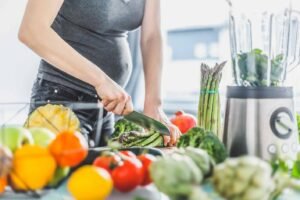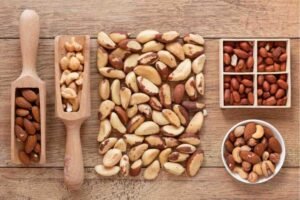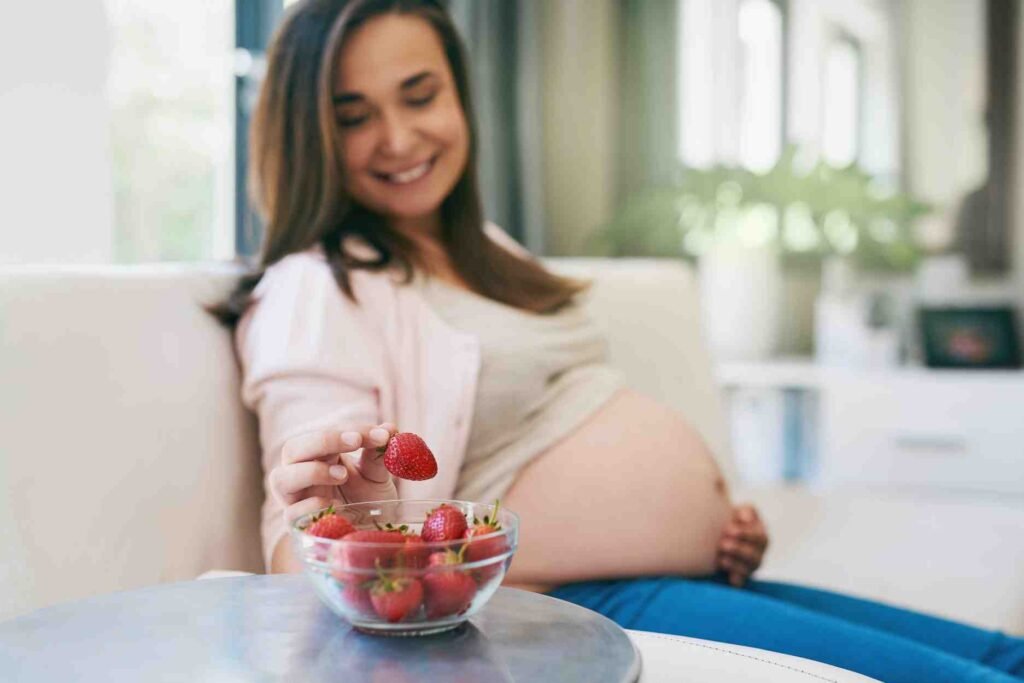A Complete Guide on Best Food for Pregnant Women
Pregnancy is a beautiful journey, filled with moments of anticipation, joy, and sometimes a little worry. One of the most common concerns for expecting mothers is ensuring they’re eating the right foods to support both their own health and the development of their baby. This guide will walk you through the best food for pregnant women, explain why these foods are so important, and help you navigate the sometimes overwhelming world of pregnancy nutrition.

Before diving into the list of the best food for pregnant women, it’s essential to understand why nutrition plays such a pivotal role during pregnancy. Your body is working hard to nurture and grow a new life, which means it has increased demands for certain nutrients. These nutrients are not just crucial for your baby’s development; they also help you stay healthy and strong throughout your pregnancy.
The Role of Nutrients in Fetal Development
The baby growing inside you relies entirely on what you eat to get the nutrients it needs. Each stage of pregnancy demands different nutrients. For instance, folic acid is vital in the first trimester to prevent neural tube defects, while calcium becomes increasingly important in the later stages as your baby’s bones begin to develop.
How Nutrition Affects Maternal Health
Your own health is equally important. Proper nutrition can help you avoid complications like gestational diabetes, anemia, and preeclampsia. It can also reduce symptoms like fatigue, morning sickness, and leg cramps.
Now, let’s explore the best food for pregnant women, ensuring you and your baby are getting the best nutritional support.
Essential Nutrients During Pregnancy
Before listing specific foods, let’s break down the key nutrients that are crucial during pregnancy.
1. Folic Acid
- Importance: Prevents neural tube defects, supports placenta growth.
- Sources: Leafy greens, fortified cereals, beans, and citrus fruits.
2. Iron
- Importance: Supports increased blood volume and prevents anemia.
- Sources: Lean meats, beans, spinach, and fortified cereals.
3. Calcium
- Importance: Builds your baby’s bones and teeth, supports muscle function.
- Sources: Dairy products, fortified plant-based milks, leafy greens.

4. Protein
- Importance: Supports fetal tissue growth, including brain development.
- Sources: Lean meats, eggs, dairy, nuts, and legumes.
5. DHA (Omega-3 Fatty Acids)
- Importance: Critical for brain and eye development.
- Sources: Fatty fish like salmon, flaxseeds, and walnuts.
6. Vitamin D
- Importance: Aids calcium absorption, promotes bone health.
- Sources: Sunlight exposure, fortified foods, and fish.
7. Fiber
- Importance: Prevents constipation, supports digestive health.
- Sources: Whole grains, fruits, vegetables, and legumes.

8. Choline
- Importance: Essential for brain development.
- Sources: Eggs, chicken, beef, and broccoli.
9. Magnesium
- Importance: Helps with muscle relaxation, reduces the risk of preterm labor.
- Sources: Nuts, seeds, whole grains, and dark chocolate.
10. Iodine
- Importance: Supports thyroid function and brain development.
- Sources: Iodized salt, dairy products, and fish.
What are The Best Food for Pregnant Women
1. Leafy Greens
- Why They’re Great: Leafy greens like spinach, kale, and Swiss chard are nutrient powerhouses. They provide essential vitamins like folic acid, iron, calcium, and fiber. Incorporating these into your diet can help support your baby’s development and keep you feeling strong and energized.
- How to Include: Add them to salads, smoothies, or sauté them as a side dish. They can also be blended into soups for a nutrient-packed meal.
2. Eggs
- Why They’re Great: Eggs are a fantastic source of high-quality protein, choline, and essential vitamins like B12. They are versatile, affordable, and easy to prepare. Choline, in particular, is vital for brain development, making eggs one of the best food for pregnant women.
- How to Include: Scramble them for breakfast, add boiled eggs to salads, or enjoy them in an omelet with lots of veggies.
3. Salmon
- Why It’s Great: Salmon is rich in DHA, an omega-3 fatty acid that’s critical for the development of your baby’s brain and eyes. It’s also a good source of protein and vitamin D.
- How to Include: Grill or bake salmon for dinner, or add it to salads and sandwiches. Limit to two servings per week to manage mercury exposure.
4. Whole Grains
- Why They’re Great: Whole grains like oats, quinoa, and brown rice are rich in fiber, which can help with digestion and prevent constipation. They also provide essential nutrients like iron, magnesium, and B vitamins.
- How to Include: Start your day with oatmeal, use quinoa as a base for salads, or swap white rice for brown rice in your meals.
5. Greek Yogurt
- Why It’s Great: Greek yogurt is high in protein and calcium, both of which are essential during pregnancy. It also contains probiotics, which support gut health, important for both mom and baby.
- How to Include: Enjoy it with fruit and honey for breakfast, add it to smoothies, or use it as a base for dips and dressings.

6. Berries
- Why They’re Great: Berries like blueberries, strawberries, and raspberries are packed with antioxidants, vitamins, and fiber. They are a delicious and healthy way to satisfy sweet cravings during pregnancy.
- How to Include: Add them to your morning cereal or yogurt, blend them into smoothies, or simply enjoy them as a snack.
7. Beans and Lentils
- Why They’re Great: Beans and lentils are rich in protein, iron, folic acid, and fiber. They’re also low in fat, making them an excellent food choice during pregnancy.
- How to Include: Add them to soups, stews, salads, or make a hearty lentil curry. They can also be used as a meat substitute in various dishes.
8. Sweet Potatoes
- Why They’re Great: Sweet potatoes are packed with beta-carotene, a precursor to vitamin A, which is essential for fetal development. They also provide fiber and are a good source of vitamin C.
- How to Include: Bake or roast sweet potatoes as a side dish, mash them, or use them in soups and casseroles.
9. Nuts and Seeds
- Why They’re Great: Nuts and seeds are excellent sources of healthy fats, protein, fiber, and various vitamins and minerals, including magnesium and zinc. They’re also easy to snack on and can be added to a variety of dishes.
- How to Include: Sprinkle them on salads, add them to yogurt or oatmeal, or carry a mix with you for a quick snack.

10. Citrus Fruits
- Why They’re Great: Citrus fruits like oranges, grapefruits, and lemons are rich in vitamin C, which aids in iron absorption and boosts the immune system. They’re also hydrating and refreshing.
- How to Include: Enjoy citrus fruits as a snack, squeeze fresh lemon or lime juice over salads, or add slices to your water for a refreshing drink.
11. Avocado
- Why It’s Great: Avocado is a fantastic source of healthy fats, particularly monounsaturated fats, which support fetal brain development. It also provides folic acid, potassium, and fiber.
- How to Include: Add avocado to salads, smoothies, or sandwiches, or simply enjoy it on toast with a sprinkle of salt.
12. Lean Meat
- Why It’s Great: Lean meats like chicken, turkey, and beef are excellent sources of high-quality protein and iron, which are essential for the increased blood volume during pregnancy and the baby’s growth.
- How to Include: Grill or bake lean meat for a main course, add it to salads, or use it in sandwiches and wraps.
13. Tofu and Tempeh
- Why They’re Great: Tofu and tempeh are plant-based sources of protein and iron, making them great alternatives for vegetarians. They’re also rich in calcium and magnesium.
- How to Include: Add tofu or tempeh to stir-fries, salads, or curries. You can also marinate and grill them for a hearty main dish.
14. Carrots
- Why They’re Great: Carrots are high in beta-carotene, which is important for the development of your baby’s skin, eyes, and organs. They’re also a good source of fiber and vitamin K.
- How to Include: Snack on raw carrots, add them to salads, or cook them into soups and stews.
15. Pumpkin Seeds
- Why They’re Great: Pumpkin seeds are rich in magnesium, iron, and zinc, all of which are crucial during pregnancy. They also provide a good source of protein and healthy fats.
- How to Include: Snack on roasted pumpkin seeds, add them to salads, or blend them into smoothies.
The Impact of Eating the Best Food for Pregnant Women
1. Supporting Fetal Development
- Brain Development: Foods rich in DHA, like salmon and walnuts, play a crucial role in the development of your baby’s brain and nervous system. Ensuring adequate intake can support cognitive function and reduce the risk of developmental delays.
- Bone Growth: Calcium-rich foods like dairy products, leafy greens, and fortified plant-based milks are vital for the development of your baby’s bones and teeth. Proper calcium intake can also help prevent bone density loss in mothers.
- Eye Health: Nutrients like vitamin A, found in sweet potatoes and carrots, are essential for the development of your baby’s eyes and can reduce the risk of vision problems later in life.

2. Reducing Pregnancy Complications
- Prevention of Neural Tube Defects: Folic acid is critical in the first trimester to prevent neural tube defects like spina bifida. Including folate-rich foods such as leafy greens, beans, and citrus fruits can significantly reduce these risks.
- Management of Anemia: Iron deficiency is a common issue during pregnancy, leading to anemia, which can cause fatigue and increase the risk of preterm delivery. Consuming iron-rich foods like lean meats, spinach, and beans helps maintain healthy iron levels.
- Gestational Diabetes Control: A diet rich in fiber from whole grains, fruits, and vegetables can help manage blood sugar levels, reducing the risk of gestational diabetes.
3. Improving Maternal Health
- Enhanced Energy Levels: Proper nutrition supports sustained energy levels, helping to combat the fatigue that often accompanies pregnancy. Protein-rich foods like eggs, Greek yogurt, and nuts provide long-lasting energy.
- Healthy Weight Gain: Eating nutrient-dense foods can help you gain the appropriate amount of weight during pregnancy, which is crucial for your health and your baby’s health. Avoiding excessive consumption of empty calories from sugary and processed foods is key.
- Emotional Well-being: Certain nutrients, like omega-3 fatty acids found in salmon and flaxseeds, have been linked to improved mood and reduced risk of postpartum depression. A well-balanced diet can help stabilize your mood and support your overall mental health.
Practical Tips for Eating the Best Food for Pregnant Women
1. Meal Planning and Preparation
- Plan Balanced Meals: Ensure each meal includes a source of protein, healthy fats, complex carbohydrates, and plenty of fruits and vegetables. This balance helps provide the full range of nutrients you need during pregnancy.
- Batch Cooking: Prepare large portions of meals like soups, stews, and casseroles, and freeze them for later. This can save time and ensure you always have healthy options available.
2. Healthy Snacking
- Nutrient-Dense Snacks: Choose snacks that provide both energy and nutrients, such as Greek yogurt with berries, apple slices with almond butter, or a handful of nuts and seeds.
- Stay Hydrated: Don’t forget that hydration is a key part of your nutrition. Water is best, but herbal teas, coconut water, and smoothies can also help keep you hydrated.

3. Managing Cravings and Aversions
- Healthy Alternatives: If you crave sugary or fatty foods, try to find healthier alternatives that still satisfy your cravings. For example, if you’re craving ice cream, try Greek yogurt with honey and fruit instead.
- Listening to Your Body: It’s okay to indulge in your cravings occasionally, but try to balance them with nutrient-rich foods. If you have food aversions, find alternative ways to get the nutrients you need. For example, if you can’t stand the taste of meat, focus on plant-based proteins like beans, lentils, and tofu.
4. Supplements as a Backup
- Prenatal Vitamins: While food should be your primary source of nutrients, prenatal vitamins can help fill in any gaps. Talk to your healthcare provider about the best prenatal vitamin for you, but remember that it’s not a substitute for a healthy diet.
- Specific Nutrient Supplements: In some cases, your healthcare provider might recommend specific supplements like iron, calcium, or DHA if your diet isn’t providing enough of these nutrients.
Supporting your Pregnancy and Your Baby’s Development
Eating the best food for pregnant women is one of the most significant ways you can support your pregnancy and your baby’s development. By focusing on nutrient-dense foods that provide the vitamins and minerals you both need, you can enjoy a healthier, more comfortable pregnancy.
Remember, every pregnancy is unique, so it’s important to listen to your body and adjust your diet as needed. If you have any concerns or specific dietary needs, don’t hesitate to reach out to a healthcare professional who can provide personalized advice.
Ultimately, the goal is to nourish both yourself and your baby, setting the foundation for a healthy future. Enjoy this special time, and embrace the opportunity to give your baby the best start in life through the power of good nutrition.


